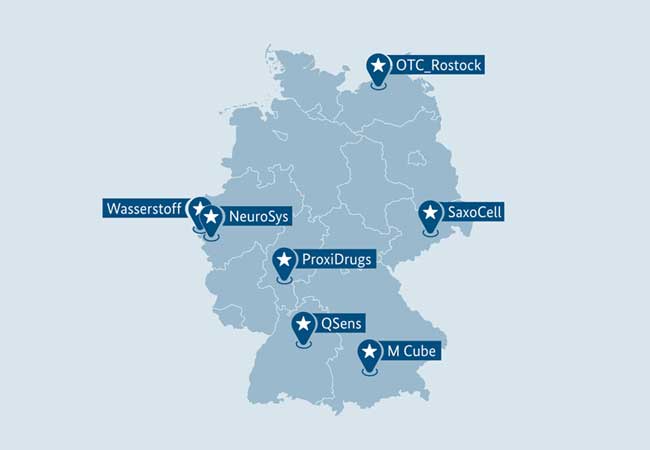
At the heart of the PROXIDRUGS cluster lies the development of novel drugs that systematically degrade disease-relevant proteins in the body. Goethe University is coordinating the alliance, which also includes researchers from the Technical University of Darmstadt, Heidelberg University, the Fraunhofer Institute for Translational Medicine and Pharmacology, the Max Planck Institute of Biophysics as well as pharmaceutical and biotechnology companies in the Rhine-Main region. PROXIDRUGS was one of only seven projects selected in the final round of the Clusters4Future competition of the Federal Ministry of Education and Research and will now receive up to €15 million in funding.
FRANKFURT. Many diseases are caused by deregulated or malfunctioning proteins. Conventional drug development strategies therefore aim to block those proteins in order to, for example, halt the uncontrolled growth of cancer cells. However, only 20 % of all disease-relevant proteins that play a role, for example in neurodegenerative disorders, cardiovascular and inflammatory diseases or infections can be targeted by classical small molecules. So far, the remaining 80 % of disease-relevant proteins are undruggable.
The PROXIDRUGS researchers now want to advance the development of a new class of drugs, which takes advantage of the cell’s own protein recycling system. PROXIDRUGS coordinator Professor Ivan Dikić from the Institute of Biochemistry II at Goethe University explains: “Our body has an ingenious system for disposing of defective, superfluous or harmful proteins. We will use this system for the systematic degradation of disease-relevant proteins.”
In each cell there is a constant turnaround of proteins. Proteins which are to be degraded are labelled with the small protein ubiquitin. This occurs with the help of specific enzymes called E3 ligases. This ubiquitin label functions as signal to the cell’s “shredder” (proteasome) that the respective proteins are no longer needed and can instead be degraded and recycled.
The PROXIDRUGS researchers now want to develop drugs which position disease-relevant proteins in close proximity of such E3 ligases. In this way, the disease-relevant proteins are marked with ubiquitin and targeted for degradation by the cell.
Professor Dikić: “Proximity-induced drugs, in short Proxidrugs, are one of the most promising new classes of drugs in biomedical research. Together with our partners from industry, we want to systematically study these innovative substances and develop novel drugs against cancer, neurodegenerative diseases as well as bacterial and viral infections. To achieve these ambitious goals, we have established the ‘Frankfurt Center for Innovation and Technologies’ at Goethe University as an academic hub which bundles all necessary platform technologies.”
Professor Enrico Schleiff, president of Goethe University, highlights the significance of the PROXIDRUGS Cluster4Future as a “transfer accelerator” for the Rhine-Main region: “With PROXIDRUGS, and thanks to the close collaboration with our partners, we are boosting research into a new class of active substances, from which drugs can be developed more quickly than before. PROXIDRUGS is representative of the consistent further development of Goethe University’s transfer strategy, building on our flagship projects in biomedical and pharmaceutical research, among which, since a few days, also numbers the ENABLE cluster project funded by the Federal State of Hessen. Through PROXIDRUGS, we can also transform the results from our research work in structural biology, chemical biology, biochemistry, pharmacy and cell biology into added economic value. Together with our strong partners in academic and industrial research in the Rhine-Main region, this will allow us to make a significant contribution to one of today’s hottest topics in drug research.”
The “Clusters4Future” competition of the Federal Ministry of Education and Research was launched in summer of 2019 as part of the High-Tech Strategy 2025. The aim is to foster knowledge and technology transfer in top-class regional networks. Sixteen finalists were initially selected from the 137 draft projects submitted, who were able to further develop their drafts into more detailed concepts from May 2020 onwards. As one of seven Cluster4Future projects, PROXIDRUGS will now be funded for an initial period of three years.








